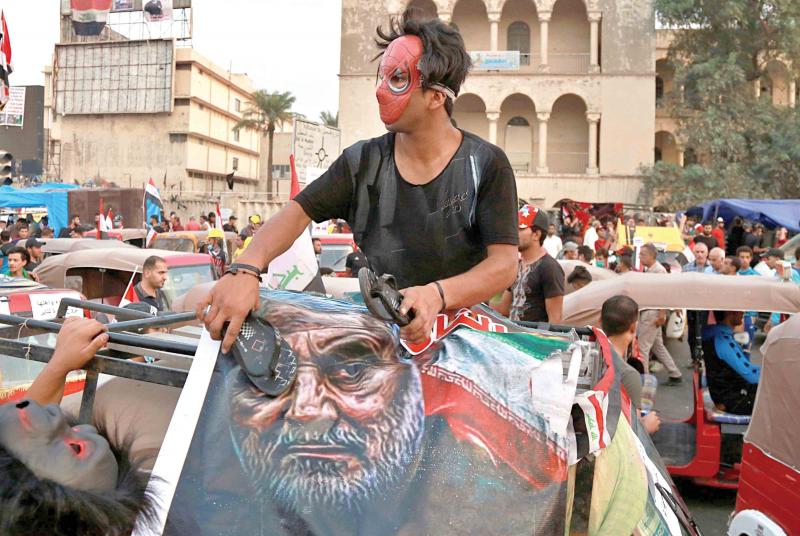
- ARAB NEWS
- 09 Jul 2025

Since early October, Iraq has been witnessing a continuous and growing wave of protests against the administrative, financial and political corruption that is plaguing the country. These protests are directed toward the entire political elite with no exceptions. In addition to protesters expressing their resentment about corruption, the younger generation is focusing its anger on the Iranian regime’s deep-rooted interference in every level of Iraq’s internal affairs. These protests are likely to be a source of several expensive lessons for the Iranian regime.
Firstly, it appears that Iraq is going through a phase of national awakening after years of simmering anger over worsening corruption, with the wealth of the country being stolen by corrupt political elites loyal to Iran, leading to the Iraqi people living in dire poverty. This awakening is led by a generation of young men, most of whom have grown up in the post-Saddam Hussein era.
This younger generation has witnessed the nature and extent of the Iranian regime’s interference and the slavish political and economic loyalty shown by most of the ruling elite in Iraq to the theocratic regime in Tehran. The recent leak of more than 700 Iranian regime documents further confirming and underlining the extensive nature of its meddling in Iraq has increased the conviction of the younger generation of the poisonous nature of the Iranian regime’s subversive role in the country.
Secondly, the younger generation has transcended and rejected Iran’s sectarian ideological and theocratic brainwashing, which had been a hallmark of previous years. The younger generation has expressed its rejection of the central role of the Shiite “marjaia” or religious guides in the politics of the country, seeing this as part of the problem that has held Iraq and the region back. Also, this younger generation has rejected the politicization of Islam, whether by Sunnis or Shiites. This, in turn, means that the younger generation has transcended ideological affiliations and rejected other sources of differences or schisms to create a stronger sense of cohesive loyalty to the Iraqi nation state, rather than to any single individual, party or religious sect.
Finally, longstanding frustration has erupted in regards to the brutality of Iran’s regime and its proxies, as well as their policies in Iraq, especially after the recent remarks by Iranian Supreme Leader Ali Khamenei, in which he accused the Iraqi and Lebanese protesters of being loyal to “foreign agendas” and seeking to implement these in their countries, apparently forgetting that Iran is a foreign, non-Arab country too.
Following Khamenei’s ill-judged comments, Iraqi protesters stepped up the pace of their demonstrations and their expressions of hostility toward Tehran. Protesters in Najaf and Karbala, two predominantly Shiite cities with a venerated religious status among the Shiite, targeted the Iranian diplomatic missions, sending a clear message to Iran’s regime that it had crossed a red line with all Iraqis, including with those who had been more tolerant to Tehran in previous years due to sectarian-religious affiliation.
It is clear that the Iranian regime’s so-called “Islamic Republic” project has already begun to collapse at home and overseas
Dr. Mohammed Al-Sulami
Iranian pilgrims have been prevented from accessing religious shrines in Najaf, with many of the posters, billboards and banners displayed by Tehran’s local proxies showing Iranian political figures being burnt, along with Iranian flags. Most of those involved in these displays of public rage are Iraqi Shiites, clearly demonstrating the extent of their anger, especially the younger generation, toward the Iranian regime’s unwelcome interference in Iraq.
Such clear messages from the Iraqi people toward Iran’s regime underline the point that there is no possibility of a return to the earlier status quo. The same also applies in Lebanon, which has witnessed a similar uprising against the political elites in the country, headed by the Iranian regime’s two key proxies: Hezbollah and the Amal Movement.
The best demonstration of this new situation was a comment made by the former secretary-general of Hezbollah, Sheikh Sobhi Al-Tufayli, who said that the protesters’ slogans for change should be raised against all parties, including the Amal Movement and Hezbollah.
“All means all,” said Al-Tufayli, citing a popular slogan used by the protesters. He pointedly added that the Amal Movement and Hezbollah are at the top of the list as they are perceived as the causes and guardians of corruption in Lebanon. If it was not for Hezbollah and the Amal Movement, he asserted, corruption would have been addressed and resolved a long time ago.
In the end, then, it seems that the Iranian regime’s Wilayat-e Faqih (Guardianship of the Islamic Jurist) extremist theocratic ideological project and its attempts to impose this across the region are facing severe domestic and external challenges. It has suffered a significant decline in popular support at all levels, coupled with rapidly dwindling support for any form of political Islam among both Sunnis and Shiites in the region.
It is clear that the Iranian regime’s so-called “Islamic Republic” project has already begun to collapse at home and overseas, and the wave of anger toward Iran’s meddling in the region and its efforts to brutally enforce political and ideological subordination to Tehran is rising quickly. It is also clear that, as this mood of defiance continues to escalate, the possibility of an Arab uprising against the Iranian regime’s ideology in the southernmost part of the Arab world — Yemen, especially in the areas controlled by the Houthi militias loyal to Iran — is impossible to rule out as more and more people assert their right to freedom from external Iranian intervention.
It is very apparent, wherever one looks in the region, that the Iranian regime is now living on borrowed time.
Dr. Mohammed Al-Sulami is Head of the International Institute for Iranian Studies (Rasanah). Twitter: @mohalsulami